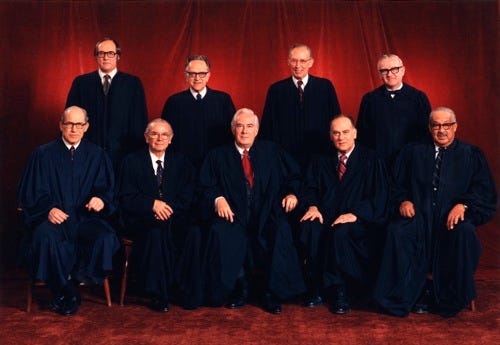Bonus 42: When Did the "Left" Lose Control of the Supreme Court
Those who criticize current calls for Supreme Court reform as coming from liberals who "lost" the Court have a curious understanding of when the ideological center of the Court shifted rightward
Welcome back to the weekly bonus content for “One First.” Although Monday’s regular newsletter will remain free for as long as I’m able to do this, much of Thursday’s content is behind a paywall to help incentivize those who are willing and able to support the work that goes into putting this newsletter together every week. I’m grateful to those of you who are already paid subscribers, and hope that those of you who aren’t will consider a paid subscription if your circumstances permit:
One of the central distinctions between the substance of Monday’s free issues and that of Thursday’s bonus content is the personalization of the latter. To that end, I thought I’d use today’s issue—and the public release of financial disclosure forms from Justices Thomas and Alito (including amended prior forms)—to reflect on a charge that’s often leveled against those calling for the Court to adopt (or have Congress adopt for it) a series of ethics/financial disclosure reforms: That those urging such reforms are only speaking out now because “the Left” (whatever that is) has “lost control” of the Supreme Court—and is belatedly trying to rein in the institution no longer doing its bidding.
There’s a whole lot about this sentiment that borders on the preposterous (starting with the idea that “the Left” is homogeneous, or that there couldn’t possibly be those who think ethics reform is a good idea regardless of who “controls” the Court). But there’s a factual point in the charge that seems worth exploring for its own sake: Assuming that there was a point when the Court was controlled by justices who could fairly be described as liberals, when did that era “end”? Those making this argument seem to think it ended only when Justice Barrett was confirmed to fill Justice Ginsburg’s seat in October 2020. In the post that follows, I’m going to take a shot at arguing that, if we really want to single out a specific date, the best candidate isn’t October 27, 2020, but July 2, 1976.

For those who are not paid subscribers, the next free installment of the newsletter will drop on Monday morning. For those who are, please read on.
Keep reading with a 7-day free trial
Subscribe to One First to keep reading this post and get 7 days of free access to the full post archives.



